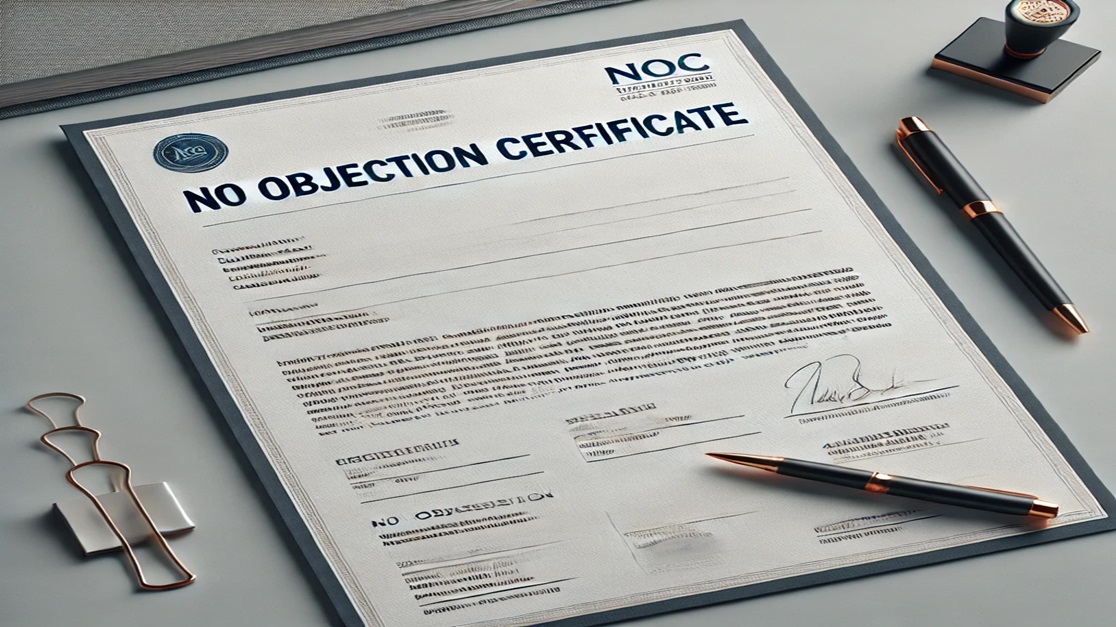The Ultimate Guide to No Objection Certificate (NOC) for Loans
April 15, 2025

Let’s assume that you’ve finally finished repaying your home loan or car loan after years of disciplined EMI payments. You celebrate the financial freedom, but then, a few years later, you try to sell your property or apply for another loan—only to find out there’s a pending liability in your name. The reason? You never obtained a No Objection Certificate (NOC) from your bank!
An NOC is a critical legal document that proves your loan is fully repaid, freeing you from any claims by the bank. Without it, you may face legal hurdles, trouble updating your credit score, and difficulties in selling or transferring ownership of your asset. This guide will help you understand everything about a Loan NOC, its benefits, the application process, and why it is indispensable for your financial security.
NOC Letter – Full Form and Meaning
NOC stands for No Objection Certificate. NOC is an official document issued by a financial institution or BANK after a borrower has fully repaid a loan. It serves as proof that the borrower has cleared all outstanding dues, including principal, interest, and additional charges, and that the bank has no claims on the asset tied to the loan.
In the case of secured loans like home loans or car loans, an NOC is essential for transferring ownership and removing hypothecation from the asset. For unsecured loans like personal loans, an NOC helps in maintaining a clean financial record.
Why is an NOC Important?
- Proof of Loan Closure – The NOC serves as documented proof that your loan is fully repaid, ensuring there are no disputes in the future.
- Helps in Removing Hypothecation – If you took a loan for a vehicle, the Registration Certificate (RC) of the car/bike will still reflect the lender’s name. The NOC is required to update ownership in the RTO records.
- Essential for Selling Property or Vehicles – Without an NOC, you might face difficulties selling a property or a vehicle that was under a loan.
- Protects Your Credit Score – Not having an NOC may result in the loan being marked as ‘unresolved’ in your credit report, affecting future loan applications.
- Avoids Future Legal Complications – It safeguards you from unnecessary claims by banks regarding the repaid loan.
How to Obtain an NOC Letter for a Loan?
Getting an NOC after repaying your loan involves a few simple steps:
1. Complete the Loan Repayment – Ensure that all EMIs, penalties, and charges have been paid.
2. Request the NOC from the Bank – Contact your bank or financial institution to initiate the request for an NOC.
3. Submit Necessary Documents – Some banks might require documents such as:
- Loan account details
- Identity proof (PAN, Aadhaar, etc.)
- Loan closure confirmation
4. Verification by the Bank – The bank will verify whether the loan account has been completely settled.
5. Issuance of the NOC – Once verified, the bank will issue an NOC, usually within 7-15 working days.
Where is an NOC Required?
- Home Loans – To ensure complete ownership of the property and update land records.
- Car Loans – To remove the bank’s name from the Registration Certificate (RC) at the RTO.
- Personal Loans – To maintain a clean financial record and avoid any credit score issues.
- Business Loans – To close outstanding business loan accounts without future liabilities.
What Happens if You Lose Your NOC?
If you misplace your NOC, follow these steps to obtain a duplicate:
- File an FIR – Report the loss at your nearest police station to avoid misuse.
- Request a Duplicate NOC – Contact the bank and submit a request for a duplicate certificate.
- Provide Required Documents – You may need to submit identity proof, loan closure proof, and a copy of the FIR.
Final Thoughts
A Loan NOC is more than just a formality—it is a key document ensuring legal, financial, and ownership clarity. Whether you have a home loan, car loan, or personal loan, securing and safely storing your NOC is crucial. Always ensure that you collect your NOC and update necessary records post-loan repayment to avoid any future hassles.
Buying a house has never been this easy! Avail Ujjivan SFB’s wide range of affordable home loan products and enjoy a hassle-free loan journey. From house purchase loan to plot loans and home improvement loans, we have it all! Alternatively, you can browse through Ujjivan SFB product suite - our wide range of financial products are designed to make your financial life better.
FAQs
1. What details should a Loan NOC include?
Your name, loan account number, property/asset details (if applicable), loan tenure, and a confirmation of full repayment from the lender.
2. How long does it take to receive an NOC?
Typically, lenders issue an NOC within 7-15 business days after loan closure.
3. Is NOC required for all types of loans?
Yes, whether secured (home, car) or unsecured (personal, business), obtaining an NOC is advisable.
4. What happens if I don’t obtain an NOC?
It may impact your credit score, create legal hurdles for selling an asset, or even allow the lender to claim ownership.
5. Can an NOC be used as legal proof?
Yes, it serves as legal proof that you have no outstanding liabilities with the lender.
6. Do I need to submit my NOC anywhere after receiving it?
Yes, if you had a secured loan (home/car), submit it to the registrar’s office (home loan) or RTO (car loan) for ownership updates.
7. Can I apply for an NOC online?
Some banks provide online requests for NOCs, while others require a physical application.
8. Is there any fee for obtaining an NOC?
Generally, no, but in case of a duplicate NOC request, the lender may charge a small fee.
9. Can an NOC be rejected?
If the loan is not fully settled or there are any pending dues, the lender may refuse to issue an NOC.
10. How should I store my NOC safely?
Keep both physical and digital copies of your NOC to prevent any future issues.
Latest Blogs

Telangana Housing Board & KPHB Colony: A Guide to Affordable Urban Housing in Hyderabad
March 14, 2025
As Telangana continues its rapid urbanisation journey, two key housing entities—Telangana Housing Board (THB) and Kukatpally Housing Board Colony (KPHB)—have played critical roles in shaping the state's real estate ecosystem.

Does Checking CIBIL Score Frequently Lower Your Credit Points?
April 07, 2025
Imagine you're planning to apply for a home loan, a credit card, or even a car loan. Naturally, you want to ensure your CIBIL score is in good shape before proceeding.

Explained: Can NRIs Buy an Agricultural Land in India?
April 03, 2025
Real estate investment is often a top priority for Non-Resident Indians (NRIs) looking to retain strong financial ties to India.

How to Improve Your CIBIL Score from 600 to 750: A Step-by-Step Guide
April 02, 2025
Your CIBIL score is like your financial reputation—banks check it before approving loans or credit cards. If your score is hovering around 600, you might face difficulties in securing credit or may get loans with higher interest rates.

What Happens When You Leave Your Savings Account Unused?
April 01, 2025
Imagine waking up one day to find that your hard-earned money is locked away and inaccessible. Sounds stressful, right? This is precisely what happens when you leave your Savings Account inactive for too long.



